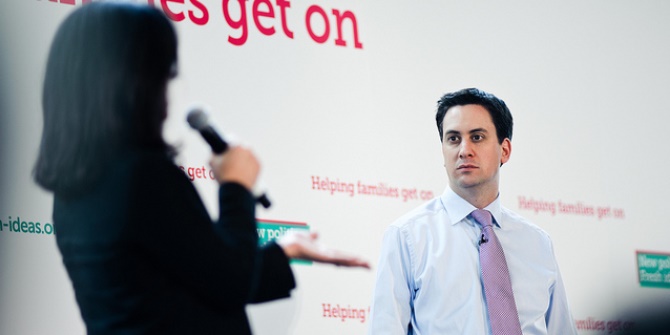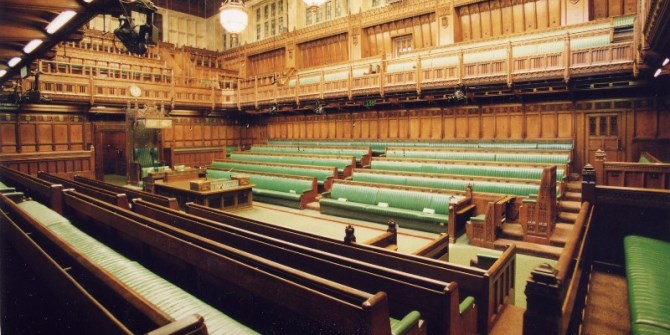 Luke McDonagh argues that the government isn’t enforcing the Digital Economy Act, which introduced severe penalties for those illegally downloading copyrighted music online, because of the potential political backlash from the large number of illegal downloaders in the UK. There is much room for improvement in legal online music infrastructure that will serve as the ‘carrot’ to end rampant online piracy.
Luke McDonagh argues that the government isn’t enforcing the Digital Economy Act, which introduced severe penalties for those illegally downloading copyrighted music online, because of the potential political backlash from the large number of illegal downloaders in the UK. There is much room for improvement in legal online music infrastructure that will serve as the ‘carrot’ to end rampant online piracy.
Few who witnessed the Olympic opening ceremony could doubt the impact which British pop music has had on the world. Watching artists as diverse as Dizzee Rascal and Paul McCartney performing, it was clear that very few countries in the world have as vibrant a music scene as the UK. In line with this, encouraging the UK’s creative sector has long been the goal of successive British governments. Nevertheless, the system of copyright licensing, particularly in the online environment, has been criticised for not being fit for purpose.
In light of this, the most eye catching proposal outlined in the eventual May 2011 Hargreaves Review of Intellectual Property was the idea of a ‘Digital Copyright Exchange’ (DCE), described as a non-governmental digital market place which could better facilitate copyright licensing and help deal with the problem of ‘orphan works’ – works whose owners cannot be traced, even after a ‘diligent’ search. The Hargreaves review has now been followed by two UK IPO reports, one published in March 2012 and one published in July 2012, by Richard Hooper, who was appointed by Vince Cable to investigate the feasibility of the ‘DCE’. The reports confirm that the ‘Copyright Hub’, as it is now being called, will be going ahead. Furthermore, it will be both ‘industry-funded and industry-led’. The scheme, which will be voluntary for rights-holders to enter into, is aimed at simplifying licensing and solving the orphan works problem, in part by encouraging the expansion of registries of works.
One of the fascinating things about the Hooper’s reports is that they highlight how politicised the debate over music use online has become. The rise of ‘illegal’ downloading of music via the internet has changed the landscape of the music industry. Music sales are way down from their peak level at the end of the 1990s. As a result, there has been much political talk over the course of the last decade about a need for a ‘carrot and stick’ strategy to move consumers away from online infringement – the ‘carrot’ representing affordable, legal and easy to use online music services, and the ‘stick’ being the threat of sanctions for continued willful infringement online.
With regard to the ‘stick’, the Labour government in 2010 enacted the Digital Economy Act (DEA), which has provisions for the sanctioning of individuals who engage in ‘free’ downloading. Nonetheless, although the legislation was passed over 2 years ago, the hard-hitting provisions have yet to be put into place. A recent open letter published in the Daily Telegraph, signed by Elton John, Pete Townshend, Professor Green and Tinie Tempah amongst others, urged the current government to implement the DEA in full.
As yet, the government seems nervous and unwilling to do so – it recently confirmed that the proposed system of sending letters to suspected illegal downloaders, with the threat of potentially disconnecting their internet connections, will not be enforced until at least 2014. One reason for this reluctance could be that the government is hyper-aware of the sheer number of people in Britain who are engaging in ‘free’ internet downloading. No democratic government can afford to ignore the inevitable unpopularity that would result from cracking down on internet use by a such a large number of people. Furthermore, the internet service providers, such as Talk Talk and BT, are not happy about having to potentially monitor cases of online infringement by their own customers. Thus far, the government has seemed content to kick the issue into the long grass – much like US legislators, who dropped the proposed ‘Stop Online Piracy Act’ last year following on similar concerns voiced by Google.
Another reason is that politicians are aware of the fact that the system of copyright licensing, particularly online, is often much more awkward than it should be. It took the music industry a long time to begin to develop online music facilities, and it was Apple’s iTunes that led the way rather than a scheme emanating from any of the traditional record companies. Even then many consumers were turned off by the fact that a song downloaded from iTunes could only be played on an Apple player due to licensing restrictions. Alternatively, an MP3 downloaded ‘illegally’ online had no such restrictions. Thus, the unlicensed song downloaded for free satisfied consumers’ wishes more than the legal, paid-for product. Such an outcome is clearly unsustainable for the music industry. Interestingly, in his report published in March 2012 on the current problems with copyright licensing Richard Hooper gave indication that he was aware of the need to placate politicians’ fears on this issue. He stated:
“A wide and diverse range of new digital services for the fixed and mobile internet that are easy to use, that offer a repertoire not too different from the physical world, that are customer-oriented and sensibly priced, reduce, for example in the eyes of the politicians, the justification for any copyright infringement by consumers.”
The report therefore highlights the fact that politicians may see some justification in the acts of online infringement by their constituents, particularly if the legal digital services are not up to scratch. From their perspective, this is somewhat understandable. Politicians are aware of the precarious position they are in – if they implement the ‘stick’ part of the strategy without having an acceptable ‘carrot’, their popularity will likely dwindle. The proposed Copyright Hub has been praised by music royalty collecting societies such as PRS for Music and PPL.
Nevertheless, time will tell whether the proposed ‘Copyright Hub’ can help produce the ‘carrot’, in the form of new online digital services, which might lead the government to bring the ‘stick’, in the form of the DEA’s provisions, into full legal force.
Note: This article gives the views of the author, and not the position of the British Politics and Policy blog, nor of the London School of Economics. Please read our comments policy before posting.
Dr Luke McDonagh is LSE Fellow in the Department of Law. He holds a PhD from Queen Mary, University of London (2011), an LLM from the London School of Economics (2006-7) and a BCL degree from NUI, Galway (2002-05). He has previously taught in the areas of Public Law, Administrative Law and EU Law at Queen Mary as well as Constitutional Law and Tort Law at NUI Galway.







